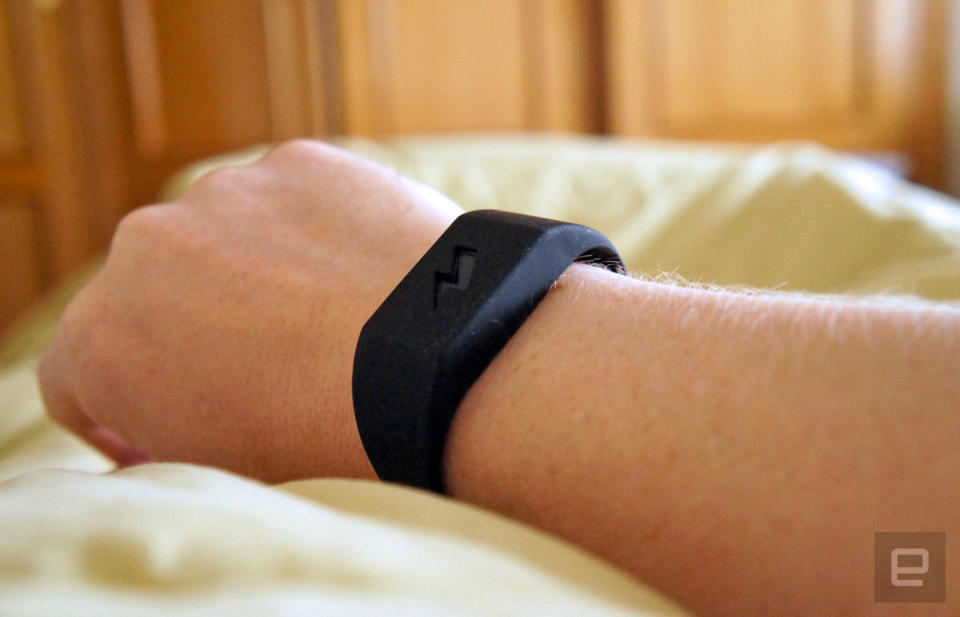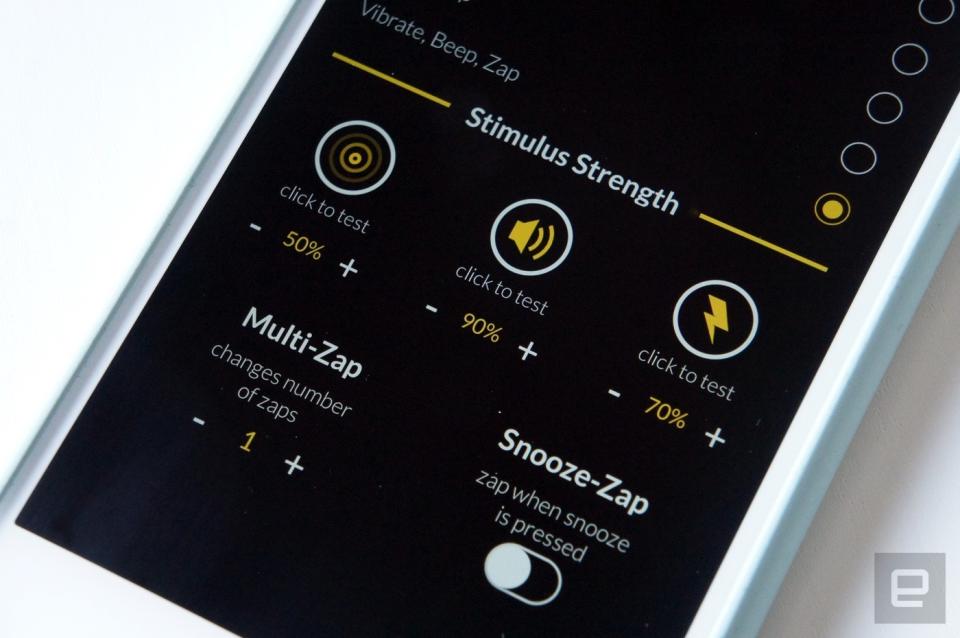The Shock Clock band uses fear and electricity to wake you up
Resistance is futile.

How hard is it to get up in the morning? When you have a job -- and want to keep it -- most of us can usually haul our sleepy asses out from beneath the duvet, even if that's at the last minute. I'm not exactly Mr. Sunshine in the mornings, but is an electric shock really the answer? Pavlok, the team behind the Shock Clock band thinks so, and luckily enough for you, I hate myself just enough that I was willing to find out if it works. You know, for science and whatnot.
The idea behind the Shock Clock is pretty simple: Punch in your desired wake-up time then tell it to vibrate, beep or give you an electric shock (or all three, in that order) to wake you up. It's aimed at chronic "snoozers" for whom loud music, the radio and regular alarm clocks aren't enough. Unlike conventional methods, though, the idea here isn't to shock you every morning. Pavlok claims it's to program yourself -- via aversion therapy -- into permanently becoming a morning person.
If Shock Clock seems familiar, that's because it's essentially the same product as the existing Pavlok we wrote about two years ago. The makers claim their original zap-dispensing wearable has helped cure everything from sugar cravings to tobacco addiction. Now they're hoping to abolish the snooze button with this single-purpose version.
Setting up the Shock Clock is easy. Pair the wristband with the Pavlok Alarm app (available for iOS and Android), and then configure your wake-up punishment of choice. You can go straight in for shocks, or give yourself a chance, and wake to a vibration on the wrist and/or beeps before deploying a shock as the last resort. I went straight for shocks because why not? A quick side note: The shocks aren't crazy strong, but they were stronger than I expected -- enough to make my open hand visibly twitch.
Given that the hardware is effectively the same, it might feel like you're being sold the same shoes twice -- especially since the Pavlok Alarm app already also exists. To offset that, Shock Clock costs a chunk less than Pavlok and will come with a revamped, more feature-rich app. What's more, it's cheaper, starting at $79 for early birds (it's being crowdfunded), eventually selling for $100. Pavlok proper costs $169.
Ironically, given the whole habit-breaking thing, Shock Clock is a essentially a gateway drug to the full Pavlok experience. If the campaign reaches $50,000, Shock Clock will come with the option to be upgraded to unlock the full suite of Pavlok habit-busting features. These include such delights as shocking you when you visit certain websites or even custom IFTTT recipes that shock you based on any number of conditions.

The first morning I wear the Shock Clock, I think I'm already cured. I wake naturally a good 10 minutes before my set time. Easy. Perhaps it was some mild anxiety that caused me to stir, though. Much like how I'll wake every hour, on the hour, whenever I have to get up for an early flight. I was actually so pleased with myself that I forgot about turning the alarm off, so I received my shock anyway 10 minutes later, conveniently as I was pouring some coffee.
The second morning I try waking with vibrations first, then tones, using the shock as the last resort. I must have relaxed into the idea because I slept right through the vibration part. The tones wake me, but only just enough for me to realize I'm about to receive a... "damnit." It zaps me, and sure enough, I'm awake. I'm groggy, though, and then I spot a flaw in the current app design: To let it know you're awake, you press the wristband for three seconds. A snoozer's delight! That's a problem the new app will solve with a feature called "Snooze Lock" that will use the motion sensors to check that you are up and awake (or just moving your wrist?). Sleep tracking will be a feature in the new app as well.
For me, at least, there's a different problem: I already have a reliable system for waking up. I use a "natural" alarm clock that gradually illuminates the room during the 30 minutes before your desired wake-up time. When the time comes, if you haven't let it know you're awake, soothing zen-like tones play in increasing volume until you do. It wakes me every time, gently, and the light makes me feel alert. Waking to a shock does the trick, but it's like using jump-leads by comparison. It's also a reminder that waking in darkness means my brain still feels like it's 4 AM.
It's worth remembering that Shock Clock isn't simply about halting sleep; it's about the habit of waking (many of us can open our eyes, only roll over and close them again). If this is your problem and nothing else you've tried works, I can see how Shock Clock might be appealing. My concern is that there's another looming problem: You either have to remember to put the Shock Clock on each night or wear it all the time, which seems a bit much for something you use for about five seconds in the morning. Also, if there's any way to game the device, I suspect the heavy snoozer within us will find and exploit it -- or just stop wearing it all together.
The team at Pavlok argues that's not a problem. The theory is that if Shock Clock does its job, just the threat of it zapping you will eventually seep into your lizard brain and its aversion to pain. With this, you'll start waking naturally too. No lights and no zen music needed.

